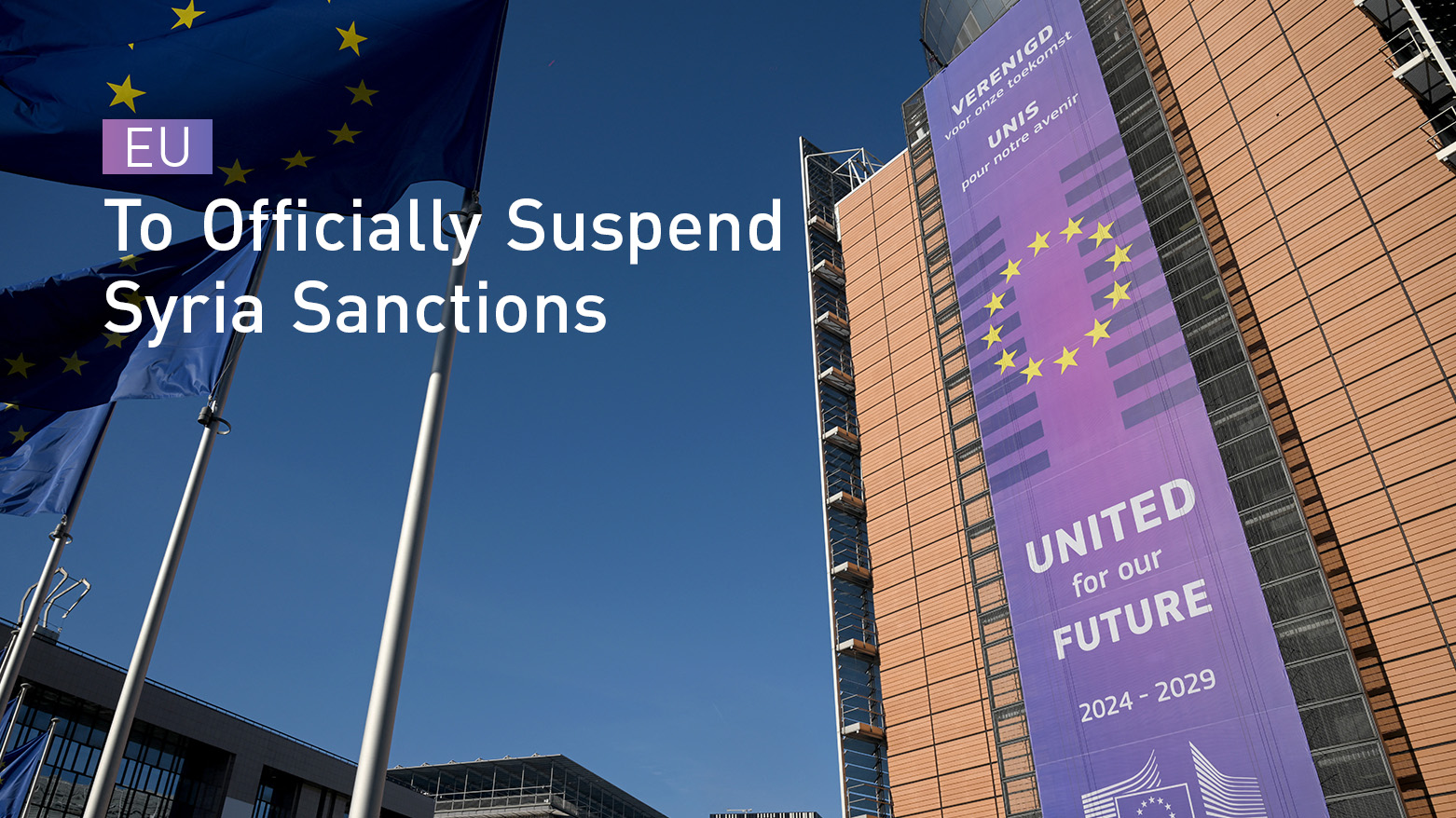EU to Officially Suspend Syria Sanctions
The decision is set to be finalized during a meeting of EU foreign ministers in Brussels, following an initial agreement reached in January.

ERBIL (Kurdistan24) – European Union diplomats announced today that the 27-member bloc will officially suspend sanctions on Syria’s banking, energy, and transport sectors next Monday, marking a significant shift in EU policy towards Damascus, According to Syrian Arab News Agency (SANA).
The decision is set to be finalized during a meeting of EU foreign ministers in Brussels, following an initial agreement reached in January.
The move is seen as the EU’s most consequential policy shift since the fall of Bashar al-Assad’s regime in December 2024.
The European Parliament’s February briefing outlined that the sanctions relief will be temporary and subject to Syria’s compliance with key conditions, including political reforms, human rights protections, and the dissolution of armed groups.
EU’s Conditions for Sanctions Relief
According to the EU briefing, the sanctions suspension is not unconditional. The bloc demands concrete progress in Syria’s transition under new leadership led by Ahmad al-Sharaa, particularly in the protection of ethnic and religious minorities, respect for human rights and women’s rights, and efforts toward a new constitutional framework.
The new Syrian leadership has pledged to:
- Draft a new constitution that ensures political inclusivity.
- Disband all remaining rebel forces to stabilize the country.
- Transition to a free-market economy to revive economic activity.
- Terminate Syria’s long-standing military alliance with Russia.
However, Sharaa has cautioned that finalizing the constitution could take up to three years, with new elections potentially delayed by four years due to the absence of a national census.
Security Concerns and Remaining Restrictions
Despite the EU’s willingness to ease economic pressure, some restrictions will remain in place due to security concerns.
The EU briefing notes that arms, surveillance equipment, and dual-use chemicals will still be banned, amid fears of renewed sectarian violence and terrorism.
Additionally, individuals and entities linked to the Assad regime will remain under EU sanctions, and the designation of Hayat Tahrir al-Sham (HTS) as a terrorist organization remains unchanged, as it is based on a United Nations decision that the EU has adopted.
Why Were These Sanctions Imposed?
The EU and the United States first imposed sanctions on Syria following the Assad regime’s brutal crackdown on anti-government protests in 2011, which later escalated into a full-scale civil war.
Key Sanctions Included:
- Trade Embargo: A ban on exporting goods to Syria, particularly dual-use items, which have both civilian and military applications. Certain imports, including Syrian oil and gas, were also prohibited to cut off revenue sources for the government.
- Oil and Energy Restrictions: International companies were barred from purchasing Syrian oil or investing in its energy sector, further isolating Syria’s economy.
- Asset Freezes: The US and EU froze Syrian government assets, including central bank funds and the personal wealth of key officials, including the Assad family.
- Financial Restrictions: Syrian financial institutions were cut off from the global banking system, making it difficult for the government to process international transactions.
- Travel Bans: Syrian officials linked to human rights violations were barred from traveling to EU countries and the US.
Major Sanctions Laws Against Syria
- Caesar Act (2020):
Named after Farid Al-Madhan AKA (Caesar), a Syrian military police defector, this US law imposed sweeping sanctions on Syrian officials, businesses, and foreign entities that engage with the Syrian government.
It targeted reconstruction efforts, preventing foreign investment in government-controlled areas. - Captagon Sanctions (2023):
The US passed a law targeting Syria’s role in the illicit drug trade, accusing Syrian officials of being major producers and traffickers of the drug Captagon.
The law aimed to disrupt financial networks funding the regime’s operations. - EU Arms and Chemical Weapons Ban:
The EU has maintained a ban on military exports to Syria.
Individuals accused of chemical weapons attacks against civilians remain under targeted sanctions.
Regional and International Reactions
The US Position on Sanctions Relief
While the EU moves forward with its phased approach, Washington has yet to signal any similar action. The Biden administration maintained its firm stance, insisting that sanctions remain critical leverage in ensuring Syria’s transition remains on track.
Iraq and Syria’s Economic Ties in Focus
As sanctions relief approaches, regional actors, particularly Iraq, are closely watching the developments. Baghdad has long advocated for easing trade restrictions, given its economic and security ties with Syria. The potential for renewed economic cooperation between Baghdad and Damascus is expected to be a key topic in upcoming bilateral meetings.
What’s Next?
With the EU’s official decision set for Monday, the coming weeks will be crucial in determining whether Syria can meet European demands for political and humanitarian reforms.
If progress is evident, further sanctions relief could follow. However, if Syria fails to uphold its commitments, the EU has made it clear that restrictions will be swiftly reimposed.
As Syria embarks on a delicate path of reconstruction and reintegration into the international community, its ability to navigate these complex diplomatic and economic conditions will define the future of its relations with Europe and the wider region.